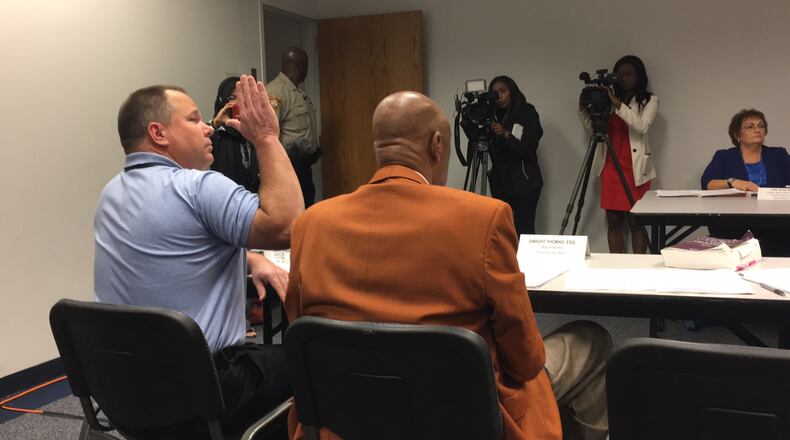After a sometimes confusing and often contentious Wednesday morning hearing, the Gwinnett County ethics board reached a decision in the case of Commissioner Tommy Hunter — but it's not saying just yet what that decision is.
And thanks to a newly filed lawsuit challenging the constitutionality of the ethics board’s existence, it might not matter in the long run anyway.
That, of course, is the goal for the Hunter team. Even with “public reprimand” being the stiffest penalty he could face, the commissioner’s camp remains as defiant as ever.
“Just to clarify, these people are still protesting and holding hearings because someone posted a comment on Facebook about a politician?” Hunter spokesman Seth Weathers, said after Wednesday’s hearing, which he did not attend. “Imagine what they could accomplish if they applied themselves to something useful.”
The ethics complaint against Hunter was filed Feb. 6, about three weeks after the commissioner's Facebook post calling U.S. Rep. John Lewis a "racist pig" was first reported by The Atlanta Journal-Constitution. The commissioner apologized for his "choice of words" in the immediate aftermath of the post, but he has continued to rile critics in the months since — by refusing to resign; by saying little else about the issue; by leaving commission meetings before the gathered protesters get up to speak; or by declining to participate in the ethics process.
Add Wednesday’s delay tactics and legal maneuvers, which could have a lasting impact, to the list.
“Some people’s mindset may be, hasn’t [Hunter] been embarrassed, hasn’t he already learned a lesson from all this?,” Christine Koehler, one of the attorneys who filed the ethics complaint, said during her opening statement before the ethics board. “And the answer to that is no.”
‘Liberal stuff’
The ethics complaint against Hunter argues that his Facebook post about Lewis, which also referred to Democrats as “Demonrats” and a “bunch of idiots,” and several others violate tenets of the county’s 2011 ethics ordinance. The ordinance is intended primarily to target conflicts of interest but also references the need to maintain “public trust.”
Hunter appeared during Wednesday morning’s hearing but declined to answer questions, citing a Georgia code section that echoes the Fifth Amendment of the United States Constitution.
Koehler eventually gave up and moved on to Robin Martinelli, who testified about her experience serving Hunter last week with a subpoena to testify at Wednesday’s hearing.
Under oath, Martinelli described Hunter as “gleeful and very talkative” and said he called the ethics process “childish” and “liberal stuff.” Martinelli said Hunter told her he wasn’t going to resign his post but didn’t plan to seek re-election when his term expires in 2020.
The ethics board also heard from Nancie Turner, the Atlanta woman who filed the complaint.
“I would hate,” Turner testified, “to have to go to Mr. Hunter if I was in the group that he talked about, a liberal or a Democrat or a person of color, and ask him for anything knowing that that’s the way he talked about me.”
After the ethics board deliberated privately for about 45 minutes, it returned to the crowded conference room where the hearing was held and announced it had reached a decision — that wouldn’t be made public until the board’s attorney put it in writing.
The board will hold another meeting to announce its decision “shortly,” chairman David Will said.
The bigger issue
Wednesday morning’s hearing happened despite Hunter’s last-minute efforts to stall it. But the long-term ramifications could be significant.
Hunter had declined to participate in the ethics process whatsoever until Tuesday afternoon, when he hired attorney Dwight Thomas to represent him before the ethics board. Thomas, who recently won a lawsuit challenging the constitutionality of DeKalb County's ethics board, filed two last-minute legal maneuvers Wednesday morning.
The first was an injunction seeking to simply stop the ethics board hearing. The second was a lawsuit suggesting the ethics board is illegal in and of itself.
The ethics board voted to continue with Wednesday’s hearing despite a judge not having ruled on either filing.
Thomas’ lawsuit challenges the constitutionality of Gwinnett’s ethics board, which, like DeKalb’s, uses appointments from private organizations to fill some spots. Will and fellow board member Charles Rousseau were appointed by such organizations — the Gwinnett County Bar Association and the Association of County Commissioners of Georgia, respectively.
DeKalb County Judge Asha Jackson’s ruling last month in favor of ex-Commissioner Sharon Barnes Sutton — and Thomas — declared that such appointments were illegal. That ruling has no direct effect on the ethics board in Gwinnett or elsewhere, and is likely headed for the Georgia Supreme Court, but it can be used as the basis for legal arguments.
The suit will not be considered until next week, when Superior Court Judge Melodie Snell Conner returns from out of town, a representative from her office said. If it’s upheld, the suit could invalidate whatever the Hunter ethics board decides — and cripple the county’s oversight efforts moving forward.
“The bigger issue now,” Koehler said, “is that Gwinnett County is going to spend thousands and thousands of dollars [to litigate the new lawsuit] when all Mr. Hunter has had to do to begin with is own what he said.”
Gwinnett County Chairman Charlotte Nash declined to comment on the lawsuit.
MYAJC.COM: REAL JOURNALISM. REAL LOCAL IMPACT.
The AJC's Tyler Estep keeps you updated on the latest happenings in Gwinnett County government and politics. You'll find more on myAJC.com, including these stories:
Never miss a minute of what's happening in Gwinnett politics. Subscribe to myAJC.com.
About the Author
Keep Reading
The Latest
Featured





